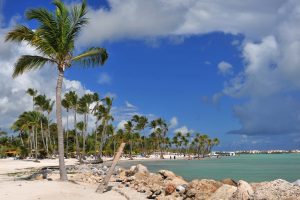The idyllic island chain of Lakshadweep is in ferment. A string of regulations proposed by its administrator, Praful Khoda Patel, a politician of India’s ruling Bharatiya Janata Party (BJP), has stirred a storm in the archipelago.
Calls are mounting for withdrawal of the controversial rules and Patel’s recall.
An archipelago of 36 islands, Lakshadweep lies in the Arabian Sea. It is just 220 to 440 kilometers from the southern Indian state of Kerala. Its 70,000-strong population is predominantly Muslim and although the people have strong ties with Kerala, they have a distinct social and cultural identity.
This distinct identity could be under threat.
Lakshadweep is a Union Territory, which means it is administered by the federal government through an administrator. The archipelago’s administrator has traditionally been drawn from the bureaucracy. Patel is the first politician to be appointed to the post. A junior minister for home affairs in Gujarat when Prime Minister Narendra Modi was chief minister of the state, Patel is known to be close to Modi.
Patel is also administrator of the union territories of Dadra & Nagar Haveli and Daman & Diu. The policies he adopted there, which are similar to the ones he has introduced in Lakshadweep, have allegedly benefited lobbies close to him while ignoring local residents. Locals fear this will be the case in Lakshadweep too.
Patel was appointed as Lakshadweep’s administrator in December 2020. Soon after taking charge, he scrapped the stringent quarantine measures for travelers from the Indian mainland to the archipelago. As a result, Lakshadweep, which had managed to remain COVID-free in 2020, soon became a hotbed of coronavirus infections. On May 22, the Union Territory reported a total tally of 6,611 positive cases. Its positivity rate is the highest in the country.
Additionally, Patel has introduced a slew of draft legislations that could have wide-ranging impact on the islands, and the lives and livelihoods of Lakshadweep’s residents.
A proposed land development plan gives the administrator vast powers to take over land and relocate people, and provides for stringent penalties for those who resist. The plan allows for mining and exploitation of mineral resources in the islands. Under the new rules, the slaughter of cows and transport of beef products has been made an offense. The Prevention of Anti-Social Activities (PASA) Regulation provides for detention of a person without any public disclosure for a period of up to a year.
The Patel administration has sought to justify the new rules by claiming that they are aimed at boosting economic development and promoting the archipelago as a tourist destination on par with neighboring Maldives. Indeed, tourist infrastructure in Lakshadweep is rudimentary and unemployment is high. Providing the economy with a shot in the arm would be welcome.
However, critics point out that the law facilitates the transfer of land to corporations and would result in indigenous communities losing ownership of their land. It provides legal cover for the administration to take over land with or without people’s consent. It is the administration’s prerogative whether or not compensation needs to be paid.
Locals fear that they will not benefit much from the development plan. Already, fishermen have been evicted from the coasts; shelters for their boats have been destroyed to clean up beaches for the setting up of resorts. It has impacted the livelihood of many fishermen.
Additionally, the kind of development envisaged under Patel will “cause the delicate ecology of the island to unravel,” according to marine biologist and scientist Rohan Arthur.
Administration officials have said that PASA was necessary to crack down on the smuggling of weapons and narcotics, which is reportedly rising in the archipelago. However, PASA appears to be a sledgehammer to swat a fly given that Lakshadweep’s crime rate is the lowest in India. Locals fear that the motivation behind the preventive detention law is to choke off protests against the administration’s decisions.
Importantly, there is concern that the BJP’s Hindutva agenda is driving Patel’s reforms. Steps like the beef ban and removing meat from students’ meals are seen as communal and anti-Muslim moves. The administration has also removed restrictions on the sale of alcohol. These moves have hurt the sentiments of Lakshadweep’s predominantly Muslim population.
Patel’s non-consultative style of functioning has come under fire. Elected representatives of the people of Lakshadweep were not consulted in writing up the land development plans and proposed laws.
Protests are growing on the island and in social media. In addition to local residents, celebrities and opposition political parties are calling for withdrawal of the controversial legislations. They are demanding that Patel be recalled.
Lakshadweep is strategically located. It lies close to the Maldives and important Sea Lanes of Communication in the Arabian Sea and Indian Ocean.
The island chain has provided New Delhi with little reason for concern so far. However, the recently introduced changes could turn a peaceful population into an angry and restive one. That is not in India’s interest.

































